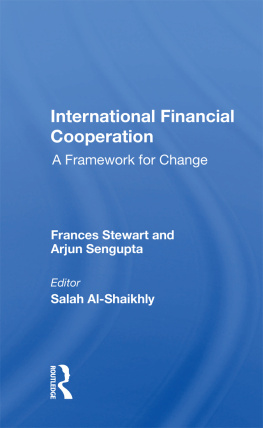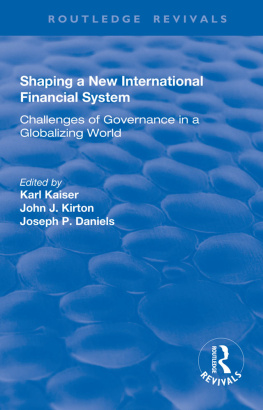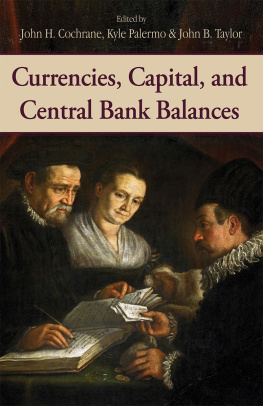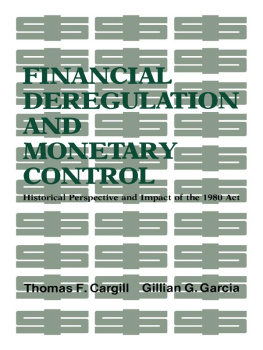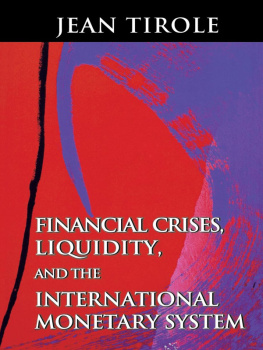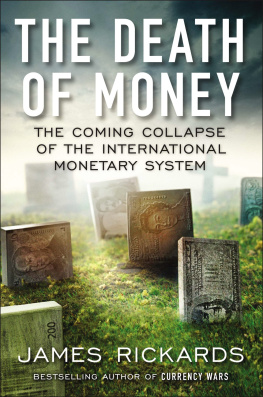International Financial Cooperation
Two volumes from the Centre for Research on the New International Economic Order, Oxford:
Volume 1
International Financial Cooperation A Framework
Frances Stewart and Arjun Sengupta
Edited by Salah Al-Shaikhly
Volume 2
Development Financing A Framework for International Financial Cooperation
Edited by Salah Al-Shaikhly
The contents of this book do not necessarily reflect the view of the Centre for Research on the New International Economic Order, Oxford, or any other organization with which the authors are connected. The authors are solely responsible for the views expressed in this book.
International Financial Cooperation
A Framework for Change
Frances Stewart
Arjun Sengupta
Editor
Salah Al-Shaikhly
First published 1982 by Westview Press
Published 2018 by Routledge
52 Vanderbilt Avenue, New York, NY 10017
2 Park Square, Milton Park, Abingdon, Oxon OX14 4RN
Routledge is an imprint of the Taylor & Francis Group, an informa business
Copyright The Centre for Research on the New International Economic Order, Oxford, 1982
All rights reserved. No part of this book may be reprinted or reproduced or utilised in any form or by any electronic, mechanical, or other means, now known or hereafter invented, including photocopying and recording, or in any information storage or retrieval system, without permission in writing from the publishers.
Notice:
Product or corporate names may be trademarks or registered trademarks, and are used only for identification and explanation without intent to infringe.
Library of Congress No. 82-80428
British Library Cataloguing in Publication Data
Stewart, Frances
International financial cooperation:
a framework for change.
1. International finance
I. Title II. Sengupta, Arjun
332'.042 HG3881
Typeset by Anne Joshua Associates, Oxford
ISBN 13: 978-0-367-01942-6 (hbk)
Table of Contents
Salah Al-Shaikhly
Salah Al-Shaikhly
In May of 1978 the North-South Round Table held its first meeting in Rome. Among the topics for discussion was the structure and functioning of the International Financial Institutions. In that meeting I recall an intervention by Dragslov Avormovic on the working of the two main institutions, i.e. the World Bank and the IMF. What he had to say about these two institutions was most impressive.
The idea of a research project into the state of the global economy after the 1974 increase of oil prices has, since that date, been a challenging proposition. The intervention by Mr Avormovic added clarity and substance to the outline of this research.
In 1979 interest was generated in the objectives of the Centre, which was already active in rendering research and technical support to Third World Countries in their efforts to promote a New International Economic Order. A proposal was drawn up by the Centre and submitted to the Regional Bureau for Arab States in UNDP who circulated it to the countries in the Arab Region. The idea was enthusiastically received especially with regard to UNDP's interest in better understanding of the North-South dialogue and issues emanating from it. UNDP, after a useful dialogue with the Centre, had agreed to fund a research topic which bears the title of this book: A Framework for International Financial Cooperation. A number of important topics were included in the research programme, some of which were covered in the report that appears in the book, others are still the subject of continuing research at the Centre. These topics were the recycling of funds from surplus to deficit countries; stabilizing the existing International Financial System; securing an adequate level of investment return for surplus countries; the role of the special drawing rights; commodity stabilization; debt reorganization; and mineral and energy financing.
Over twenty high-level experts and scholars were commissioned to contribute research papers on the subject. Over forty other specialists participated in the discussion of these papers and contributed in one way or another to their publication. The first Seminar discussed the format of the research work and was held in Oxford in March 1980; the second was to review the papers that were being submitted to the Centre and was held in New York in October 1980; and the last one was to revise the final version of the papers and was held in Oxford in February 1981. Francis Stewart and Arjun Sengupta have very kindly agreed to act as joint co-ordinators of this research project and have prepared the final text of this book.
UNDP involvement in the Centre's activities has not only contributed to the dialogue necessary amongst and within Third World countries to seek conclusions to overwhelming issues facing them, but also strengthened the Centre's capabilities in being a catalyst in North-South issues. Initial reaction to the original report has been extremely positive and a number of the suggestions that appear in this book were put as items for discussion on the agenda of the Committee of Development Planning which was held in New York during the first week of October 1981. It is our hope that the proposals contained in this book may encourage debate and the formulation of a possible strategy policy, and hopefully provide some solutions in any future global negotiations between developing and developed countries.
Salah Al-Shaikhly
Director
Centre for Research on the
New International Economic Order
Oxford, U.K.
October 1981
A number of these papers are appearing in a separate volume entitled Development Financing; A Framework for International Financial Cooperation. Selected papers edited by Salah Al-Shaikhly.
The Director of the Centre for Research on the New International Economic Order gratefully acknowledges the vision and initiative taken by the previous Director of the Centre, Dr Kamal Hossain, who was the main force, not only behind this project, but also of the whole idea and concept of the Centre.
Acknowledgement is also due to Arthur Hazelwood, the Warden of Queen Elizabeth House, for supervising and bringing to a successful conclusion this study and so competently organizing the seminars that were part of the process of preparing this study. The support of the UNDP and the competent officers of the Regional Programming Division of the Bureau for Arab States, namely Fuad Mohammed, Akram Qursha and Dede Davies, is much appreciated.
The contributions of the various authors to this process is obviously self-evident, and the Centre is grateful to all those personnel of the IMF, IBRD and the Institute of Commonwealth Studies, who gave advice and discussed the draft of this study at various stages.
Salah Al-Shaikhly
A historical perspective
Many economic historians would agree that the economic crisis of the late 1970s and early 1980s is not too dissimilar to that of the late 1920s and early 1930s. Although, perhaps, the difference between the two crises is in the magnitude of the resulting damage to the global economy. The present experience of unemployment, trade and payments restrictions, currency uncertainty and the collapse of the international credit system is definitely analogous to that of 1929-31. No one factor can be singled out as the cause of the present recession. It is the accumulation over the past 20 years of many short-sighted policies and an overall mismanagement of the global economy that led to the present-day situation. Raul Prebish calls it 'the second crisis of capitalism'. The events of the past decade proves, if anything, the interrelated character of the present global economic system.

